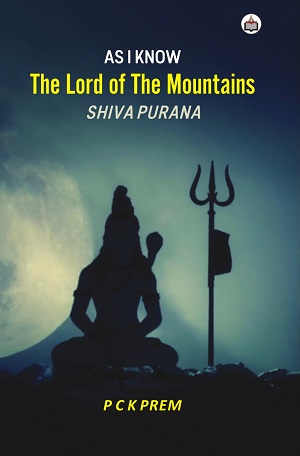Mar 03, 2026
Mar 03, 2026
by P C K Prem
As I Know: The Lord of the Mountains – Shiv Purana: 127
Brahma eulogies delight lord Mahadeva and profuse praise benefits Pitahamaha, who realises that the fulfillment of objective – the creation of prajas, is possible with the blessing of Mahadeva Vayudeva continues the legend as the sages listen to devotedly
 Vayudeva told clearly and narrated the sequence of events. Lord Mahadeva smiled, thought, and then, with melodious, musical and soothing thunder full of meaning and enchanting objective, said to Brahma, “O Supreme Lord, you underwent austere tapasya for the increase of creation – prajas. I am satisfied with the tapa and penance and therefore, I bless you with the desired boon.”
Vayudeva told clearly and narrated the sequence of events. Lord Mahadeva smiled, thought, and then, with melodious, musical and soothing thunder full of meaning and enchanting objective, said to Brahma, “O Supreme Lord, you underwent austere tapasya for the increase of creation – prajas. I am satisfied with the tapa and penance and therefore, I bless you with the desired boon.”
After inspiring remarks, the most generous and the lord of mild and soft nature, the lord of lords, Sri Hari asked goddess Rudrani to emerge out of the middle and left part of the body. She was the most virtuous goddess para-shakti – the divine power, the power of the beyond – of Supreme lord Shiva and the essence of Brahma. One observed no space and scope for flaws and distortions in respect of birth, death and age.
Goddess Bhawani whose real essence was unknown even to the gods, took birth from the left part of the body of lord Shiva and thus, fulfilled the boon conferred on Supreme Brahma. She was the goddess and mother of all the gods born of the limbs of lord Shiva. When Brahma witnessed the divine image of the goddess, the goddess of all created beings, Supreme Purusa Brahma got up and humbly saluted. Afterward, he praised the most wise, omnipresent, subtle and infinite goddess, who illuminated the entire universe.
He humbly requested, “O mother of all the created beings, first Mahadeva created me O Mahadevi and thereafter, he assigned to me the sacred task of creation of prajas.”
After a short while, the Supreme lord resumed, “I created the entire universe with your sanction. However, O goddess, despite determination and vow, the gods and living beings so created, do not increase. Population is static and it is not a healthy sign. It happens in spite of the task of creation I perform frequently. Now, I understand, creation will not increase. Therefore, O goddess, I wish to increase the creation of the universe and so want to adopt the approach of physical union of male and female tattva (essence). I find no origin of the female family prior to your origin. Therefore, I do not have the power to create female tattva.”
The Supreme lord carried on, “You are the origin of all powers in the universe. Therefore, I pray before you, the most benevolent and generous goddess, who bestows divine boons on its devotees. O omnipresent goddess, the destroyer of fears of the universe, you become the daughter of son Daksa for the sake of increase in creation, who took birth from one of my limbs.”
Born out of the mind (assume yoni?) of Brahma, Supreme Brahma, thus, implored before Rudrani. She smiled and out of the middle of eyebrows, a dazzling enlightening energy originated. Observing the brilliant energy materialising, the lord of Lords Sri Hari smiled and said, “You undergo tapasya, meditate on Supreme Brahma, and thereafter, fulfill a divine yearning.”
On request from Brahma, the goddess became daughter of prajapati Daksa and fulfilled Shiva’s wish. Goddess Shiva infused wonderful divine power in Supreme Brahma and then, entered the body of lord Shiva. Thereafter, Shiva disappeared. From that time onward, feelings of passion and love for women took birth and the intensity of physical pleasures situated in the entire tribe of women powerful enough to attract and captivate men gathered strength. Thereafter, through the physical union of men and women, the sacred process of creation originated. Act of heavenly union of the opposite sexes gave delight and satisfaction to Supreme Brahma. Thus, the sacred function of creation and procreation entrusted to men and women proved gratifying. It was a divinely ordained duty of man to increase the tribe within the parameters of morality and dharma. A man had no right to kill the seed once situated in the womb of a woman and if a man destroys the seed, it is a great sin.
11-Feb-2024
More by : P C K Prem